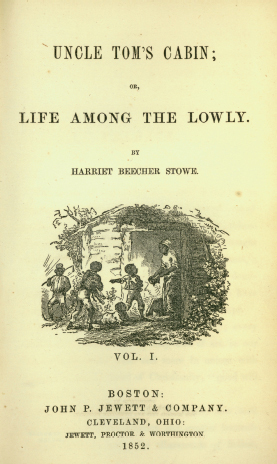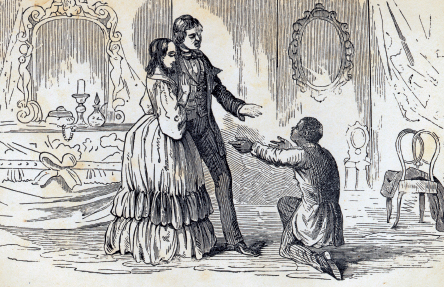Exploring American Histories: Printed Page 374
Documents 12.3 and 12.4
Slavery in Literature: Two Views
The 1852 publication of Uncle Tom’s Cabin by Harriet Beecher Stowe helped mobilize northern antislavery sentiment but provoked a hostile reaction among Southerners, who said she misrepresented their way of life. Written in response to Stowe’s work, Caroline Hentz’s novel The Planter’s Northern Bride argued that slaves’ lives were better than those of working-class and poor Northerners. Hentz defended southern values and traditions, including slavery. The following excerpt from Uncle Tom’s Cabin depicts a scene in which the overseer Simon Legree punishes Tom for helping another slave. In the second selection, from The Planter’s Northern Bride, Hentz’s main character, Eulalia Moreland, describes meeting the slaves on her husband’s plantation.
Explore
| 12.3 | Harriet Beecher Stowe | Uncle Tom’s Cabin, 1852 |

“Well, here’s a pious dog, at last, let down among us sinners!—a saint, a gentleman, and no less, to talk to us sinners about our sins! Powerful holy critter, he must be! Here, you rascal, you make believe to be so pious—didn’t you never hear, out of yer Bible, ‘Servants, obey yer masters’? An’t I yer master? Didn’t I pay down twelve hundred dollars, cash, for all there is inside yer old cussed black shell? An’t yer mine, now, body and soul?” he said, giving Tom a violent kick with his heavy boot; “tell me!”
In the very depth of physical suffering, bowed by brutal oppression, this question shot a gleam of joy and triumph through Tom’s soul. He suddenly stretched himself up, and, looking earnestly to heaven, while the tears and blood that flowed down his face mingled, he exclaimed,
“No! no! no! my soul an’t yours, Mas’r! You haven’t bought it—ye can’t buy it! It’s been bought and paid for, by one that is able to keep it—no matter, no matter, you can’t harm me!”
“I can’t!” said Legree, with a sneer; “we’ll see—we’ll see! Here, Sambo, Quimbo, give this dog such a breakin’ in as he won’t get over this month!”
Source: Harriet Beecher Stowe, Uncle Tom’s Cabin; or, Life among the Lowly (Boston: John P. Jewett, 1852), 197.
Explore
| 12.4 | Caroline Hentz | The Planter’s Northern Bride, 1854 |

Soon, returning in grand march from the fields, came the negroes, poising on their heads immense baskets, brimming with the light and flaky cotton. . . . Eulalia . . . recollected all the horrible stories she had heard of negro insurrections, and thought what an awful thing it was to be at the mercy of so many slaves, on that lonely plantation. When she saw her husband going out among them, and they all closed round, shutting him in as with a thick cloud, she asked herself if he were really safe. Safe. . . . They gathered round him, eager to get within reach of his hand, the sound of his voice, the glance of his kind, protecting, yet commanding eye. More like a father welcomed by his children . . . he stood, the centre of that sable ring. . . . He appeared to her in a new character. She had known him as the fond, devoted bridegroom; now he was invested with the authority and responsibility of a master. And she must share that responsibility, assist him in his duties, and make the welfare, comfort, and happiness of these dependent beings the great object of her life. . . .
Never before had she made an elaborate comparison between the white and the black man. She had so often heard her father say that they were born equal . . . that she had believed it. . . . But as she looked at her husband, standing in their midst, the representative of the fair sons of Japheth [son of the biblical Noah], wearing on his brow the signet of a loftier, nobler destiny, every lineament and feature expressive of intellect and power, and then at each of that dark, lowly throng, she felt a conviction that freedom, in its broadest latitude, education, with its most exalted privileges, could never make them equal to him.
Source: Caroline Lee Hentz, The Planter’s Northern Bride (Philadelphia: T. B. Peterson and Brothers, 1854), 331–33.
Interpret the Evidence
Question
What do these passages reveal about northern and southern opinions about slaves and slavery?
Question
Compare the attitudes of Simon Legree and Mr. Moreland toward their slaves. How might these characterizations have affected northern and southern readers?
Put It in Context
Question
What do these different characterizations suggest about mid-nineteenth-century responses to the Fugitive Slave Act?